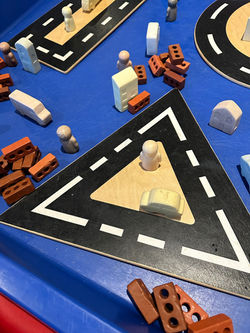
Our approach to learning
How the EYFS is being delivered in the setting?
Welcome to Lilly Brook Pre School where we embrace the principles of social constructivism.
We have activities across the seven areas and core skills that we work towards each term.
These core skills are reinforced across open ended questions, presented activities and toys, adult to child interactions and focus activities.
Our focus is on fostering meaningful interactions between our dedicated staff and your child, ensuring a strong relationship right from the start. Each child is welcomed into our nurturing environment by their keyworker, who will guide them through our routines and observe their development across all areas of learning.
After six weeks, we provide a personalized starting points report, helping us understand your child's existing knowledge and outline the next steps in their learning journey, all documented through a creative scrapbook that celebrates their achievements.
At the end of their learning journey with us, we joyfully celebrate your child's transition to Primary school with a delightful summer party. This special occasion allows us to hand back their cherished learning journey, filled with precious moments and achievements. Many of our past students return years later to reminisce and share their experiences, highlighting the lasting impact of their time here. Join us in creating wonderful memories that your family can treasure for years to come!
 colour matching bears |  Shape Fishing |  What is a pattern Focus timeDescribe your image |
|---|---|---|
 Match and countDescribe your image |  Rhyme TimeNursery and Rhyme time |  Picasso playdough facesDescribe your image |
The Lilly Brook Way Poem
Learning is fun and we like to play
Investigating new activities in play every day
Listening to each other, with imaginative stories , new words to say
Learning from each other as we explore our play
Your choices, your play, your say
Bright home sewn wall hangings, brighter beginnings the EYFS way
Respecting each other , discussing how we feel, seeking solutions hooray!
Our community where we belong, working together, we prepare next steps to move us along
Outreaching arms we work in partnership, finding solutions when things go wrong
Keeping ourselves moving, healthy and strong
 playdough |  shapes cogs and puzzles |  can you build a shape |
|---|---|---|
 mark making lines |  coloured water and magnets |  Shape Roads |
 coloured water |  Dinosaur Road |  Building with blocks |
 natural world |  Magnifying glass |  Seaworld |
 Train Road |  Mark Making Puzzles |  Numbers and Shapes |
Focus Time
A scaffolded curriculum of experiences
Our Curriculum at Lilly Brook Childcare
At Lilly Brook Childcare, our curriculum is ambitious, carefully sequenced and built around children’s developmental stages. We organise learning into three progressive groups — Tadpoles, Froglets and Frogs — to ensure children build knowledge and skills cumulatively over time.
Our curriculum is rooted in the Early Years Foundation Stage (EYFS) and reflects Ofsted’s expectations that children experience a well-planned, coherently sequenced curriculum that develops communication, language, personal development and early academic skills.
Tadpoles – Foundations for Learning
Curriculum Intent:
To develop the prime areas of learning, particularly Communication and Language and Personal, Social and Emotional Development, as the foundation for all future learning.
Implementation:
In Tadpoles, we prioritise high-quality interactions. Adults focus on developing children’s attention and listening skills through warm, responsive engagement. Activities are short, purposeful and rooted in play.
We model simple language, encourage shared attention, and support early turn-taking to build social understanding. Through songs, repetition and predictable routines, children begin to develop early communication and emotional security.
Impact:
Children develop increasing attention spans, begin to respond to simple instructions, engage in reciprocal interactions and demonstrate early self-regulation skills.
Froglets – Building Engagement and Early Concepts
Curriculum Intent:
To deepen engagement and introduce early knowledge in mathematics and literacy while continuing to strengthen the prime areas.
Implementation:
Children participate in short, structured activities designed to extend focus and enjoyment in learning. Adults introduce number language through practical, meaningful experiences such as counting, comparing quantities and recognising patterns.
Phonological awareness is developed through rhymes, songs and rhythm activities, forming secure foundations for early phonics. Adults carefully scaffold language, extending vocabulary and encouraging children to express ideas more clearly.
Impact:
Children demonstrate growing confidence in participating in group activities, use emerging number language in play, join in with rhymes and begin to sustain attention for longer periods.
Frogs – Extending Language, Thinking and Knowledge
Curriculum Intent:
To develop confident communicators and independent learners who can articulate ideas, explore new knowledge and think critically.
Implementation:
Adults and children engage in shared experiences that promote discussion, reflection and deeper thinking. Staff model ambitious vocabulary and scaffold children’s language, supporting progression from single words to extended sentences and more complex explanations.
Children are encouraged to express feelings, share viewpoints and explore the world around them. Learning opportunities introduce new knowledge and concepts in a structured way, ensuring children build on what they already know.
Impact:
Children communicate effectively, use increasingly complex language, demonstrate curiosity about the world and show readiness for the next stage of their education.

